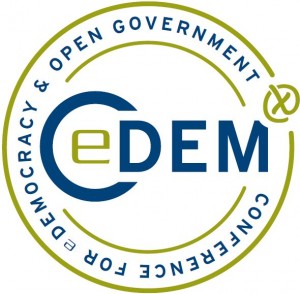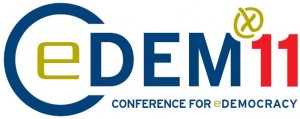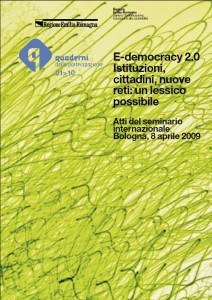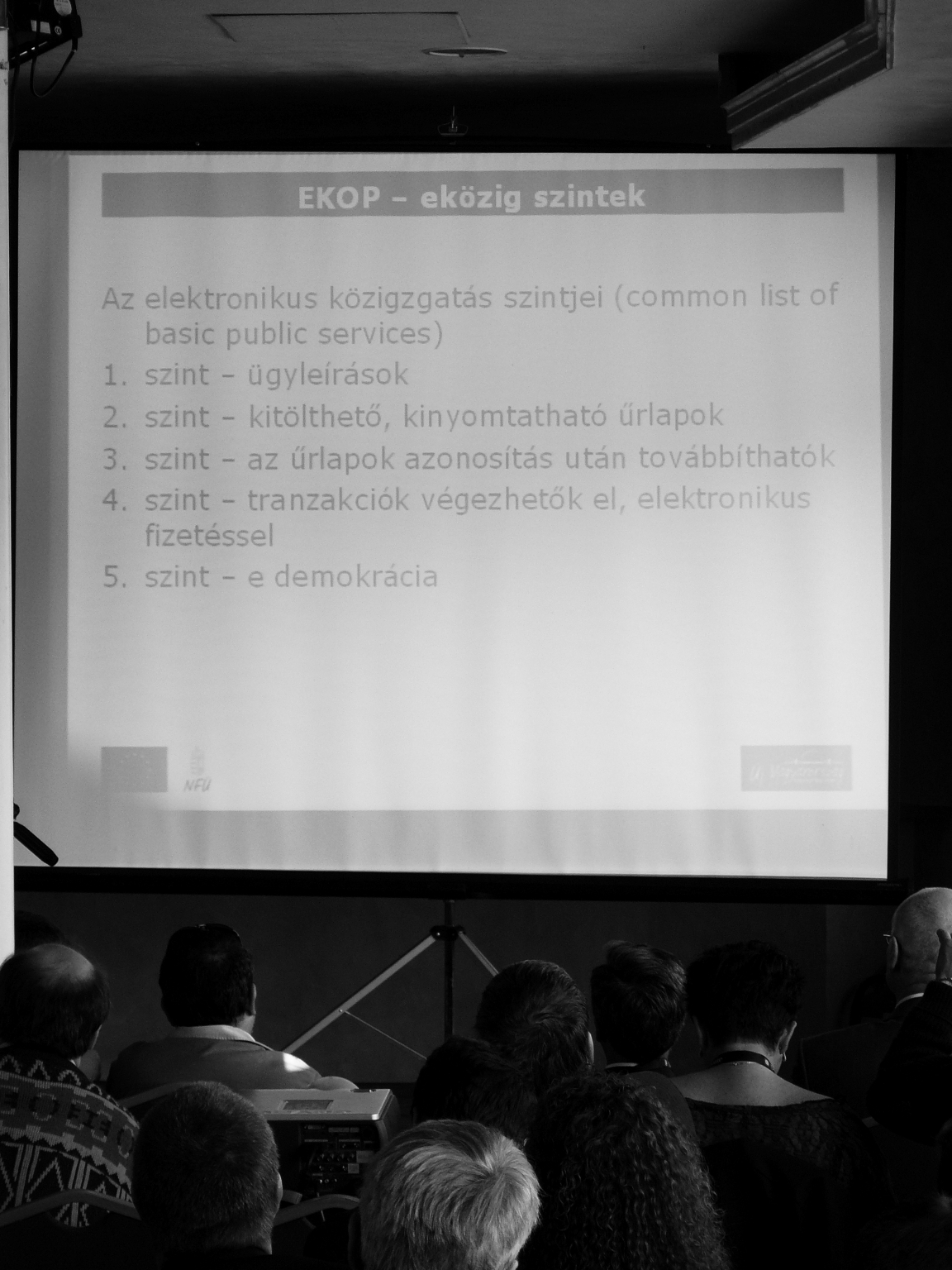Only articles in with the "e-Democracy" tag are displayed
To display all articles click
here.
 |
11. April 2011 – 15:28 by Centre for E-Government
|
 CeDEM11: The international “Conference on E-Democracy and Open Government 2011” takes place in Krems (Austria) on 5 and 6 May 2011. A substantial supporting programme has already been planned.
CeDEM11: The international “Conference on E-Democracy and Open Government 2011” takes place in Krems (Austria) on 5 and 6 May 2011. A substantial supporting programme has already been planned.
Follow these Links for further Information
www.donau-uni.ac.at/cedem
Posted in Events, Partners | No Comments »
 |
21. October 2010 – 15:29 by Centre for E-Government
|
Call for Papers
During the last 10 years, the world has focused on social media and the new forms of societal behaviour, including content generation, collaboration and sharing as well as network organisation. These behaviours and expectations, in particular transparency and access to data, new ways of interacting with government and democratic institutions will continue to develop, and profound changes in society are to be expected. Society has been confronted with Open Government, Open Data and Open Access. What have the experiences been so far? How do these impact society, democratic structures and organisations? What changes occur at citizen level? What are the implications for democracy, society, science and business?
The Conference for E-Democracy and Open Government - CeDEM11 – presents the following Tracks (Submission Deadline: 1 Dec. 2010):
E-Participation
- Julia Glidden (21C Consulting, UK)
- Jeremy Millard (Danish Technological Institute, DK)
- Norbert Kersting (Stellenbosch University, ZA)
Open Government
- Philipp Müller (University of Salzburg, Business School, AT)
- Axel Bruns (Queensland University of Technology, AUS)
E-Voting
- Melanie Volkamer (Technical University Darmstadt, GER)
- Thad Hall (University of Utah, USA)
Open Data and Open Access
- Andy Williamson (Hansard Society, UK)
Location: Danube University Krems, Austria
Date: 5-6 May 2011
Further Information at the Conference Website:
https://www.donau-uni.ac.at/cedem
DEADLINE for SUBMISSIONS: 1 December 2010
Posted in Events | No Comments »
 |
6. August 2010 – 17:28 by Institute for Electronic Participation
|
E-participation & E-democracy workshop was organized as a part of the Citizens Participation University 2010 which took place from 20th to 24th of July in the Civil College in Kunszentmiklós-Kunbábony (Hungary).
10 NGOs representatives and activists from Armenia, Belgium, Hungary, Slovakia, Slovenia, Serbia, Poland and Romania attended the workshop.
Participants were introduced with E-participation / E-democracy concept, political documents of the Council of Europe relating to eDemocracy, current e-participation developments in Central and Eastern Europe and different e-participation tools as well as good practices. The second part of the workshop facilitated open discussion about opportunities for involving e-participation tools into current and future civil society projects in the region.
The workshop was lead by Mr. Csaba Madarász (e-democracy expert and consultant, Hungary) and Mr. Simon Delakorda, M.Sc. (Institute for Electronic Participation, Slovenia)
Citizens Participation University 2010 was organized by the Civil College Foundation and Central and Eastern European Citizens Network (CEE CN).
Csaba Madarász and Simon Delakorda
Workshop presentations:
1. eParticipation in the CEE: NGO’s perspective (pdf, 4,10 mb).

Citizens Participation University 2010 participants @ CEE CN

Simon Delakorda and Csaba Madarász @ CEE CN
Posted in Events, experince, good practice, ICT, members, Tools, Trends | No Comments »
 |
27. April 2010 – 14:57 by Luca Raffini (University of Bergamo)
|
Sono disponibili online gli atti del seminario “E-democracy 2.0 – Istituzioni, cittadini, nuove reti: un lessico possibile” (pdf):
 Il volume riporta integralmente i lavori del seminario internazionale tenutosi l’8 aprile 2009 a Bologna e organizzato dalla Regione Emilia-Romagna, in collaborazione con l’Università di Bergamo, l’associazione DEPP e il network europeo Pep-net.
Il volume riporta integralmente i lavori del seminario internazionale tenutosi l’8 aprile 2009 a Bologna e organizzato dalla Regione Emilia-Romagna, in collaborazione con l’Università di Bergamo, l’associazione DEPP e il network europeo Pep-net.
Nel corso del seminario, esperti italiani e internazionali, amministratori e practicioners, hanno tracciato un quadro delle esperienze di e-democracy realizzate in Italia e in Europa, evidenziandone limiti e potenzialità e individuando possibili prospettive di sviluppo. La strutturazione del seminario e il coinvolgimento di una pluralità di punti di vista e di competenze, ha consentito di affrontare, in una cornice integrata, le potenzialità democratiche del web 2.0, sia con riferimento alle esperienze di e-democracy istituzionale che alle forme di partecipazione online “dal basso”.
Le presentazioni dei relatori, Sabrina Franceschini, Anna Carola Freschi, Bryan Loader, Sandra Lotti, Wainer Lusoli, Rolf Lührs, Peter Mambrey, Mayo Fuster Morell, Luca Raffini, Laura Sartori, Chiara Sebastiani e il vivace dibattito che ha visto interagire i relatori con i numerosi partecipanti (oltre 160), hanno permesso di confrontare una pluralità di approcci teorici e pratiche. Loader in particolare ha sottolineato sia il carattere ambivalente dell’utilizzo delle nuove tecnologie come strumento di partecipazione e di ‘strong democracy’ oppure come semplice perfezionamento della democrazia neoliberista, sia la relazione fra utilizzo delle nuove tecnologie e processi di de-istitutionalizzazione.
Sebastiani ha evidenziato come le nuove tecnologie contribuiscono a trasformare la sfera pubblica e le pratiche democratiche, mentre Sartori si è soffermata sulla persistenza della questione del digital divide non solo in termini di accesso ma anche in termini di cultura digitale. Si è guardato all’esperienza statunitense, con particolare riferimento alla campagna elettorale di Barak Obama, per riflettere sulle opportunità di empowerment offerte dai nuovi strumenti del web 2.0 (Lusoli). Read the rest of this entry »
Posted in Uncategorized | 3 Comments »
 |
15. April 2010 – 17:54 by Institute for Electronic Participation
|
A number of civil society e-participation projects has emerged in recent years in Slovenia aiming to strengthen civil dialogue and utilize the internet to support participatory democracy. This is a 2nd contribution to the CEE CN background paper provided for the PEP-NET on-line consultation “eParticipation in Central and Eastern Europe: The big questions” (available in pdf file at the Institute for Electronic Participation web site).
The article is providing a short description of the most visible of recent e-participation initiatives implemented by the non-governmental organizations in Slovenia including:
1. Citizen’s forum European Debates (https://www.evropske-razprave.si/)
2. NGO’s e-Participation portal during the Slovenian EU Council Presidency (https://www.predsedovanje.si/)
3. Open-source NGO’s e-Participation platform for on-line civil dialogue (https://www.sodeluj.net/)
4. Slovenian Civil Society e-Participation web service (https://www.e-participacija.si/)
Simon Delakorda, M.Sc.
Institute for Electronic Participation
Web: https://www.inepa.eu
Posted in good practice, members, Projects, Tools | No Comments »
 |
24. March 2010 – 11:31 by Institute for Electronic Participation
|
Executive summary of presentation from the 11th Bled Forum on Europe Foresight Conference “The Future of Information Society and Challenges for Good Governance”, organized by the Centre for eGovernance development from 10th to 12th March 2010 in Bled, Slovenia:
According to the latest UN E-Participation Index measurement, the majority of South East Europe countries (Albania, Croatia, FYR Macedonia, Moldova, Montenegro and Romania), improved their global standing regarding the quality and usefulness of information and services for the purpose of engaging its citizens in public policy making through the use of e-government programs. Nevertheless, e-participation in SEE region is still falling behind their e-government developments. An overview of current e-participation situation in SEE within government domain is presented, highlighting key elements needed for strengthening e-democracy in the region. One of them is focusing on non-governmental organizations and civil society e-participation experience (e.g. on-line Citizen’s forum) needed for shaping inclusive and citizens oriented e-government policy.
Presentation slides are available at the Institute for Electronic Participation web site https://www.inepa.si/images/stories/mapping_edemocracy_see_region_delakorda.pdf (pdf, 1.49 mb).
As has become customary over the years the conference concluded with a draft declaration, which had been adopted by the participants of the conference. The process of formulating the declaration is based upon the main issues presented by the lecturers and highlighted by the participants in the discussions which followed.
To achieve even wider participation in the formulation of the Final Declaration of the 11th Bled Forum on Europe, your are kindly invited to provide comments, inputs, questions, add issues important to the development of information society not only in South East Europe, but around the world.
Please send your comments or your video responses to info.cegd@cegd.eu until the 12th of April 2010 and make sure your voice is heard and your opinion is included in the final declaration. You can publish your comments directly to European Debates on-line forum facilitated by the Institute for Electronic Participation (INePA) by fulfilling discussion form (Please enter your Username – Uporabniško ime, message Confirmation code – Potrditvena koda and submit your comment – Pošlji. No prior forum registration is required. Forum is also available in English language). The forum is providing a deliberation space for facilitated public debates and consultations on relevant European issues.
Web links to relevant sites:
Draft declaration of the 11th Bled Forum (pdf, 71 kb)
European Debates on-line forum
Simon Delakorda, M.Sc.
Institute for Electronic Participation
Posted in Events, News, Partners, Projects, Trends | 1 Comment »
 |
28. May 2009 – 21:34 by Civil College
|
There has been an event, called Internetboat in Hungary, which primary focus is shifting each year – 2009 theme has been the vast plan for the Hungarian “Digital Public Works”, and the communicational activities from the government behind.
It is widly known, that these kind of events although trying to push together some stakeholders of the fields around the “Digital Public Works”, but the success is mainly based on the organizers creativity.
One interesting thing beside the real reason, why I am typing this article, is a programme from the Hungarian Telecottage Association – called the Digital Solidarity Catalogue.
It is in an old fashioned e-book format from Flipviewer – for me I see no reason, why not to use the internet for these kind of publishing acts – which is a collection of IT programs from different areas with a social focus. It is a nice collection with strong focus on Hungary.
During the last year, it has become obvious for most of us, that the culture of e-democracy is widely embedded in different political cultures of each country – and Hungary is in the disadvantaged group right know.
A strong representation for this, is in a slide – and a speech – which has been held by dr. Akos Balint, the programme leader of the Hungarian National Development Agenency’s (responsible for the EU-money programs) Public Service Reform Directional Program.
As can be seen on this slide – the EKOP programme for public service reform has 5 levels. It has been said, that this is align with the EU (?) structure of CLBPS (Common list of basic public services).
No doubt for us, that E-democracy is not part of the CLBPS, although, it has some relation to all levels. We should have the question in our mind – what is the reason for putting the power and trust that e-democracy can offer to societies to such a place, that will not have and support?
In my understanding, one solution, that mr.Bálint do not really know, what is e-democracy.
The other one is there is no real reason in the mind of the decision makers, to support e-democracy in Hungary from these programmes… I do not really want to choose.

Posted in News | No Comments »
 |
5. May 2009 – 10:33 by E-Voting.CC
|
Finally our newest project has been released and delivered to our readers: The biannual free special  interest magazine “Modern Democracy” by E-Voting.CC.
interest magazine “Modern Democracy” by E-Voting.CC.
As I have announced in an earlier entry we issued the first edition of our magazine dealing with selected topics in the field of E-Democracy and it’s newest developments. The magazine is distributed all around the world.
Before I give you a quick overview of the contents, I want to thank all of you who have mailed us the registration coupons. The responses were overwhelmingly positive and gave us the affirmation that such a magazine is needed and wanted. Thank you for all the positive feedback!
The first article deals with the upcoming student union elections in Austria. This event will mark the entry of Austria into the list of countries with legally binding electronic elections. Students will be able to cast their vote via Internet from May 18th until May 22nd – one week before the paper election. The results will be counted after the last polling stations are closed.
The intention behind this project is to give every student an easy and uncomplicated way of participating in these biannual elections and to innovate the Austrian voting procedures.
Read the rest of this entry »
Posted in Interview, News, Projects, Trends, Uncategorized | No Comments »
 |
4. March 2009 – 11:15 by E-Voting.CC
|
This is a reply to the post: “Recommendation on E-democracy – adopted by the COE”.
It shall clarify the critiques on the CAHDE working-group, posted here earlier, which – in our opinion – missed out some details about the project.
The Council of Europe (CoE) established in 2002 the Ad-Hoc Committee on Electronic Democracy (CAHDE) aiming at creating a legal document suggesting standards of E-Democracy, formulating principles for introduction and providing generic definitions and analyses of tools and policies to facilitate the introduction of E-Democracy. The goals were challenging and manifold: they span from the general reaffirmation of essentials of democracy and the extension of democracy by using ICTs to facilitate information and deliberation of political issues and until the increase of transparency and accountability of democratic institutions and processes. The Committee of Ministers adopted the recommendation on February 18th, 2009.
A critical discussion of results and outcomes is important and necessary. Especially if we are aiming at giving advice on upcoming developments and technologies, that are not mainstream in the near future. Let us clarify some important points in advance and sketch the framework for discussion.
Read the rest of this entry »
Posted in News, Projects, Tools | No Comments »
 |
7. January 2009 – 17:27 by E-Voting.CC
|
E-Voting.CC is currently working on a recent project to publish a magazine for the e-democracy community. The first issue of the magazine will deal with e-democracy in general, further issues will deal with e-voting in detail, e-participation projects and much more. The magazine will be distributed for free by post twice a year.
We will also include short news, detailed news, project news, recent developments and articles. We would be glad to get your input regarding projects and recent developments in the field.
Should you be interested in enrolling in our subscription list or should you want to contribute to our magazine, please send us an email (office@e-voting.cc) with your postal data, name and your email address.
We wish you a happy new year and we’ll inform you as soon as the magazine is available.
Daniel Botz, E-Voting.CC
Posted in News, Projects | 3 Comments »
 CeDEM11: The international “Conference on E-Democracy and Open Government 2011” takes place in Krems (Austria) on 5 and 6 May 2011. A substantial supporting programme has already been planned.
CeDEM11: The international “Conference on E-Democracy and Open Government 2011” takes place in Krems (Austria) on 5 and 6 May 2011. A substantial supporting programme has already been planned.



 Il volume riporta integralmente i lavori del seminario internazionale tenutosi l’8 aprile 2009 a Bologna e organizzato dalla Regione Emilia-Romagna, in collaborazione con l’Università di Bergamo, l’associazione DEPP e il network europeo Pep-net.
Il volume riporta integralmente i lavori del seminario internazionale tenutosi l’8 aprile 2009 a Bologna e organizzato dalla Regione Emilia-Romagna, in collaborazione con l’Università di Bergamo, l’associazione DEPP e il network europeo Pep-net.







